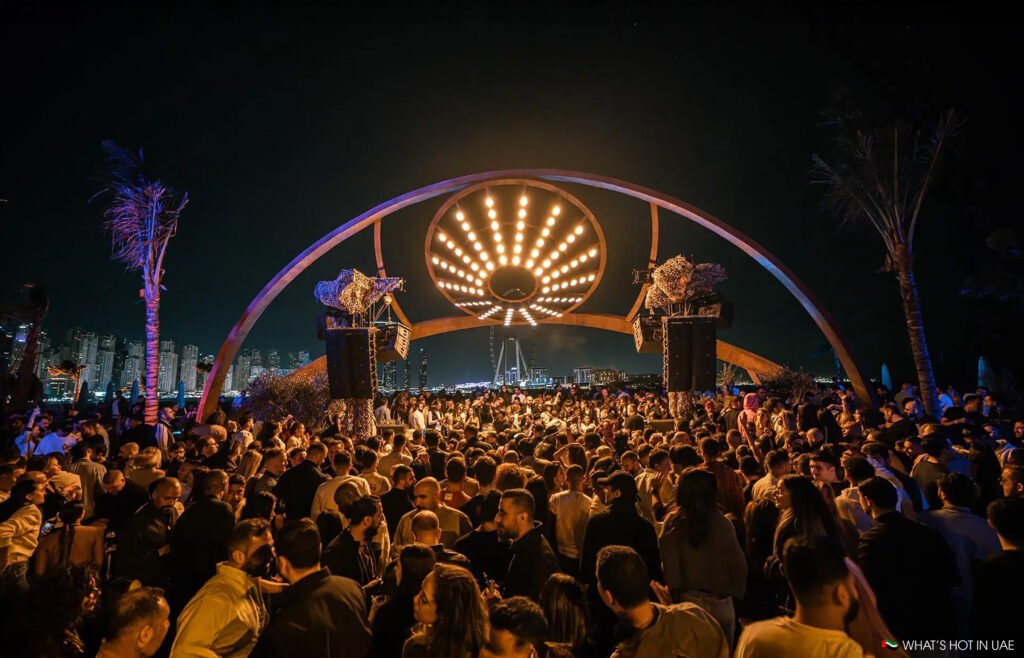The moment darkness falls over Dubai, something shifts. Not just the temperature—though that helps. The entire city sheds its daytime corporate skin and reveals something wilder underneath.
You’ll notice it first in the car parks. Ferraris and Lamborghinis line up outside hotel lobbies like they’re attending a supercar convention. Valets in crisp uniforms sprint between vehicles. Bass lines thump through soundproofed walls. The smell hits you next—oud mixed with expensive perfume and shisha smoke drifting from every terrace.
This is Dubai night. When the emirate stops pretending to be a business hub and admits what it really loves: excess, music, and showing off.
Over 300 licensed venues now operate across this Muslim-majority emirate—a fact that still surprises first-time visitors. The nightlife industry generates AED 2.3 billion annually, which explains why every major hotel group fights for celebrity DJ bookings and exclusive partnerships.
Why Dubai Night Feels Different From Everywhere Else
Most cities slow down after sunset. Dubai accelerates like someone floored the throttle.
Walk through Business Bay around 10pm. You’ll see Egyptian bouncers checking IDs outside clubs where international DJs play to crowds from literally 200+ nationalities. The bartender serving your overpriced vodka might be from Manila. Your table neighbours could be British bankers celebrating a deal, Lebanese entrepreneurs showing off new watches, Indian tech workers on their night off, and Russian models who arrived on someone’s yacht.
That’s not even a special night. That’s Thursday.
The heat drops around 9pm and suddenly everyone emerges. Hotel lobbies that were empty during the day now buzz with energy. Girls in heels navigate marble floors. Guys in tailored shirts check their hair in every reflective surface. Groups huddle near entrances deciding which venue looks worth the entry fee.
Investment in nightlife venues exceeded AED 800 million last year. You can tell. The production values rival anything in Ibiza or Miami. Laser systems that probably cost more than a house. Sound systems tuned by acoustic engineers. Interior design that screams “we spent stupid money on this.”
But here’s what makes Dubai night actually interesting: the cultural tension. This is a Muslim-majority emirate where alcohol stays illegal outside licensed venues. You can drink yourself stupid in a hotel club, then step outside and get arrested for public intoxication. That edge—that constant awareness of boundaries—creates a specific energy you won’t find in London or New York.
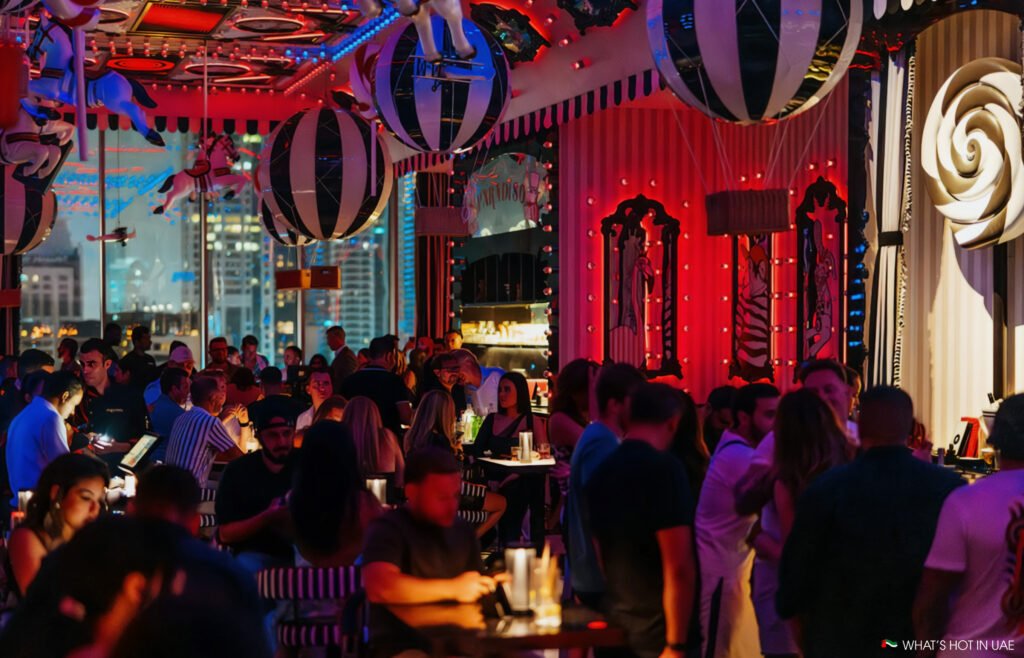
Where To Go Tonight: Current Hotspots
Nightclubs here book international DJs who headline Coachella and Tomorrowland the rest of the year. The outdoor superclubs format works brilliantly when temperatures cooperate. Expect crowds who actually know their music—not just Instagram kids seeking content.
The skyline views makes other cities jealous. Burj Khalifa glows in the distance. Cranes dot the horizon. The whole city spreads out below like someone knocked over a jewellery box.
Soho Garden in Meydan operates as three venues in one. Start with dinner on the terrace. Move to the lounge for cocktails. End at the main club when things get serious around midnight. Live musicians transition seamlessly into DJ sets. The crowd shifts from couples having dinner to groups ready to dance until 3am.
Terra Solis by Tomorrowland brings Belgian festival culture to Dubai South’s desert landscape. This one surprises people. Instead of polished hotel clubs, you get open-air parties under actual stars. Sand underfoot. Fairy lights overhead. DJ booth front and centre. The vibe feels less manufactured than central Dubai venues—more authentic, somehow.
O Lounge on Sheikh Zayed Road attracts a specific crowd: people who want glamour without the chaos. Gold accents everywhere. Plush seating. Smooth beats instead of pounding bass. The late-night dining menu actually tastes good, which sets it apart from most clubs serving “food.”
Bohemia at Beach by FIVE on Palm Jumeirah delivers exactly what the name promises. Sand. Ocean breeze. DJ playing house music. Girls dancing barefoot. Guys in linen shirts pretending they’re in Mykonos. It works, though. The chic beach party format keeps going well past midnight when most beach clubs close.
Clubs Locals Actually Recommend
Tourists hit the obvious spots. Residents know better options.
1 OAK Dubai inside JW Marriott Marquis imports New York swagger with hip-hop playlists that hit harder than most Dubai venues. Door selection stays strict even midweek. The bouncer will actually turn you away for trainers, regardless of how expensive they look.
Blu Dubai at V Hotel favours R&B over electronic music. International artists perform monthly—actual performers, not just DJs pressing play. The intimate layout means you’re never stuck at the back. Bottle service comes with proper presentation: sparklers, the whole theatrical show.
Iris Dubai at Meydan starts with live music around 9pm then shifts to deep house after midnight. That transition matters. You can bring parents for early drinks, then stay when things get interesting. The view across Meydan Racecourse towards distant city lights adds drama most clubs lack.
STK Downtown operates as dinner that becomes a club around 11pm. The restaurant doesn’t clear out—it just transforms. DJs play from inside the dining area. Tables get pushed aside. Suddenly you’re dancing where someone was eating steak an hour ago. It shouldn’t work. Somehow does.
Nammos Dubai at Four Seasons Jumeirah channels Mykonos energy into beach luxury. Day parties blur into night sessions without anyone noticing the transition. The crowd leans heavily affluent and fashion-conscious. Weekend reservations book weeks ahead. Midweek offers better chances for walk-ins.
Entry costs run AED 100–200. Women often enter free before midnight. Drinks start from AED 60–90. Dress smart—bouncers refuse trainers and shorts without discussion.
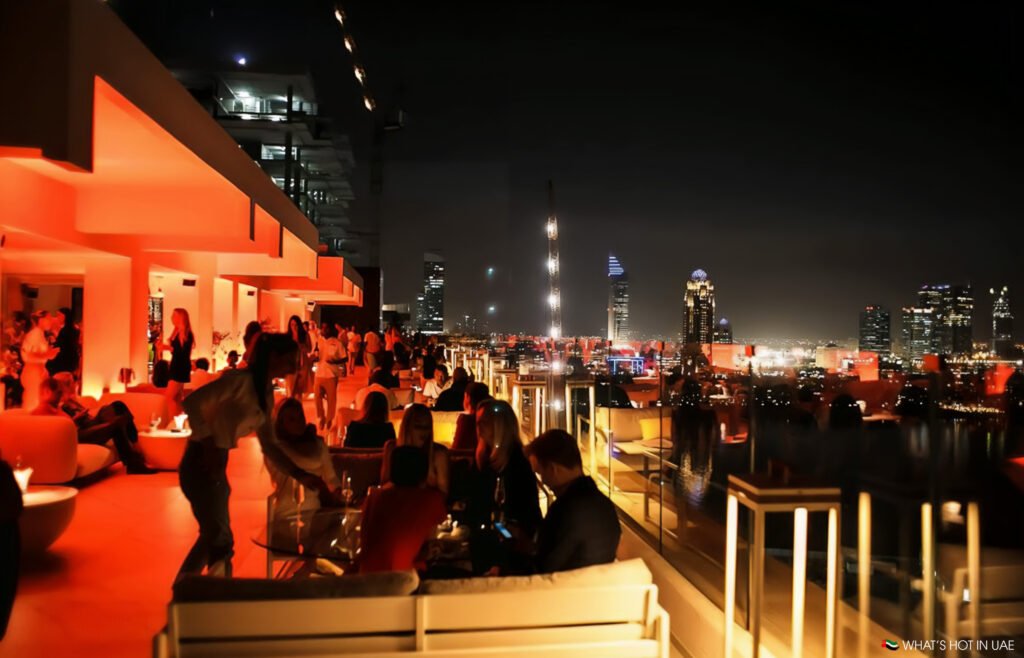
Beyond Clubs: Other Ways To Experience Dubai Night
Not every evening needs a DJ booth and bottle service.
Burj Khalifa’s observation deck operates until 10pm. Visit just before closing. Smaller crowds mean clearer views and actual space at the windows. The city lights spread below like circuitry. You can see individual cars moving on Sheikh Zayed Road from 555 metres up.
Dubai Marina Walk stretches for kilometres along the waterfront. Cafés and shisha lounges line both sides. Walk here around midnight. Surprisingly peaceful despite the crowds. Safe enough that solo women stroll alone. The yachts bobbing in the marina cost more than most people’s houses.
Desert safari companies offer night experiences combining dune bashing with BBQ dinners and star-gazing. The darkness out there—actual darkness, rare in Dubai—reveals impressive star density. Operations using vintage Land Rovers feel less touristy than the modern coach tours.
The View at The Palm sits 240 metres up with aerial perspectives of Palm Jumeirah’s outline glowing against dark water. Glass floors terrify some visitors. Thrill others. The viewing platform stays open late enough for proper night photography.
Moving Between Venues After Dark
The Metro runs until midnight most days, extending to 1am on Fridays. Red and Green Lines connect major nightlife districts. Trains arrive every few minutes. Carriages stay clean and safe even late. You’ll see the full Dubai demographic mix: workers heading home, clubbers heading out, couples returning from dinner.
Taxis operate 24/7. Look for cream-coloured cabs or use apps like Careem, Bolt, and Zed. Fares start around AED 12. Prices increase slightly after 2am. Drivers know every club and hotel. Just say the venue name—they’ll know it.
Parking exists throughout Dubai with 24-hour paid options. Spaces near Dubai Marina and Downtown fill fast after 9pm. The RTA parking app shows availability and handles payment. Traffic wardens enforce overnight. Yes, really.
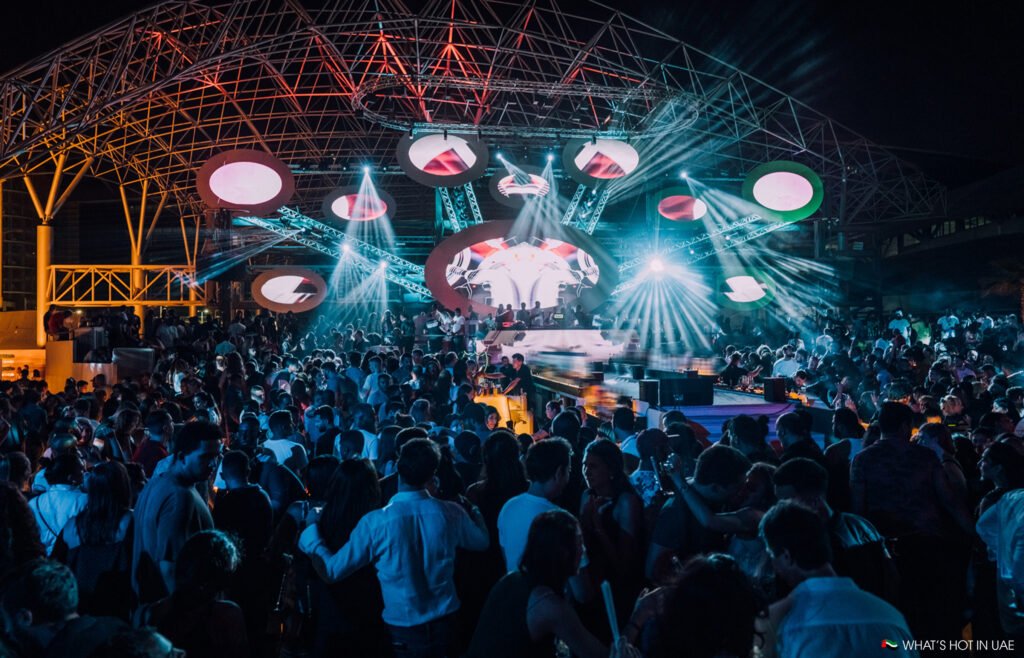
Rules Worth Following (The Cultural Tension Explained)
Dubai night operates on clear boundaries. Cross them and things get expensive or worse.
You must be 21 or older to drink or enter most clubs. Everyone gets ID checked. Bouncers don’t care if you’re clearly older. No ID means no entry. Carry Emirates ID or passport always.
Dress codes favour smart-casual minimum. Upscale venues refuse flip-flops and sleeveless shirts. When uncertain, overdress slightly. Getting turned away at doors wastes entire evenings and taxi fares.
Public conduct matters more here than Western cities. Keep affection private. Police patrol entertainment districts. They’re not looking for trouble, but public intoxication or loud behaviour draws fines. The rules aren’t suggestions.
Here’s the cultural tension in action: alcohol stays legal only inside licensed venues. Hotels, clubs, and specific restaurants hold licenses. Step outside with a drink and you’re breaking law. Drink in parks or on beaches—also illegal. The boundary between permitted excess and criminal behaviour is literally a doorway.
Never drink and drive. Zero tolerance policies mean even one drink risks arrest. Taxis cost AED 30. DUI charges cost your job, visa, and freedom.
What Dubai Night Actually Costs
Club entry: AED 100–200 (women often free before midnight) Drinks inside clubs: AED 60–90 each (premium venues charge more) Dinner and lounge experience: AED 250–400 mid-range Yacht parties: AED 500–1000 depending on duration Desert night trips: AED 150–300 including food and entertainment
Budget AED 400–600 per person for a full night out. That includes transport, entry, drinks, and late-night food. Premium venues and bottle service dramatically increase costs.
Late-Night Food That Actually Delivers
Zaatar w Zeit operates 24/7 across multiple locations. Lebanese comfort food hits differently at 3am. The manakeesh stays consistently good regardless of branch or hour. You’ll recognise the place by the queue of people in club attire ordering cheese pies.
Operation Falafel in JBR specialises in shawarma perfection after midnight. The JBR Walk location stays packed with beach club overflow. Service somehow remains friendly despite the chaos. Watch the shawarma guy work—it’s performance art.
Al Reef Bakery in Jumeirah serves famous manakeesh until dawn. Locals queue here after clubs close. The scene outside—Porsches, club dresses, Arabic pastries—feels quintessentially Dubai. The cultural mix in one queue: exactly what makes Dubai night interesting.
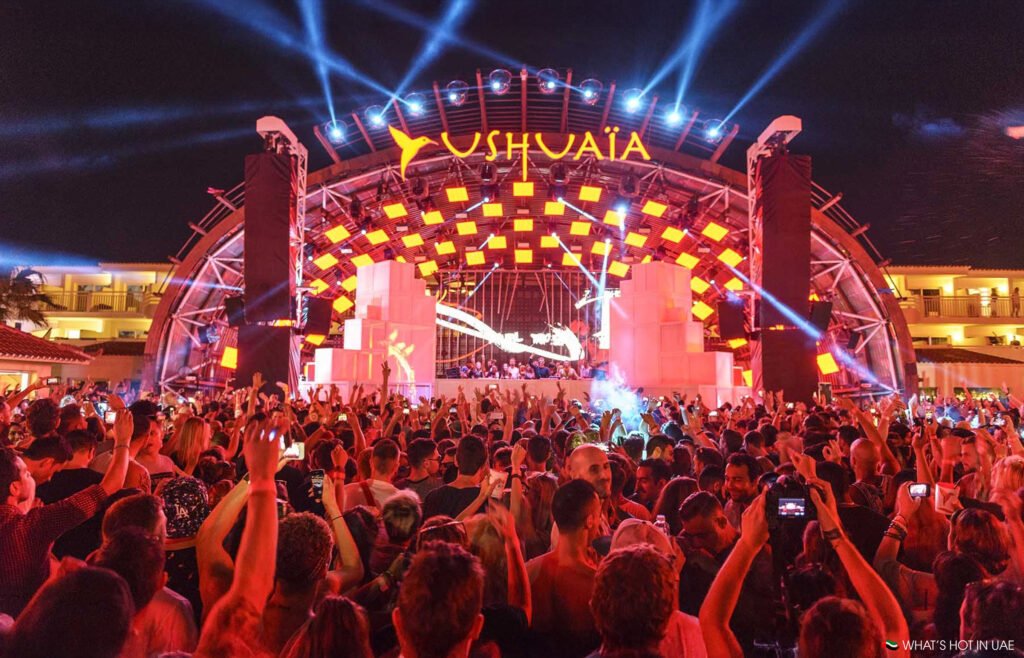
Districts Decoded
Downtown and DIFC host upscale bars, lounges, and rooftop clubs. Crowds skew professional and affluent. Venues here charge premium prices but deliver quality. Bouncers enforce dress codes strictly. This is where expense accounts come to die.
Dubai Marina and JBR attract trendy, tourist-friendly crowds near the beach. The Walk buzzes most nights. Multiple venues cluster together. You can venue-hop on foot. More accessible price-wise than Downtown. Less pretentious energy.
Business Bay and Sheikh Zayed Road offer late-night bars and mixed crowds. Less polished than Downtown. More experimental with music policy. This is where residents go when they’re tired of tourist-heavy venues.
Palm Jumeirah delivers beach parties, high-end clubs, and fine dining. Transport becomes trickier here. Taxis queue at hotel entrances but filling up fast. Consider ride-hailing apps for faster pickup. Beautiful setting. Pain to reach.
Making Dubai Night Work For You
Start planning around 8pm. Most venues hit capacity between 11pm and midnight. Arrive earlier for guaranteed entry and better table selection. Late arrivals wait in queues while early birds sip drinks inside.
Check venue social media for guest DJs and special events. Instagram stories announce same-day changes. Line-ups shift frequently. What you planned might not be what’s actually happening.
Pace yourself with the temperature transition. Indoor air conditioning runs Arctic cold. Outdoor terraces stay warm until late. That swing affects alcohol tolerance more than you’d expect. Hydration matters.
Budget realistically for the full evening. Dubai night costs more than most cities. Factor in transport, entry, drinks, and late-night food. Nights out regularly exceed AED 500 per person. Come prepared or stay disappointed.
More Info
Dubai night typically begins around 9pm when temperatures cool. Most clubs open by 10pm with peak crowds arriving between 11pm and midnight. Beach clubs often start earlier with 7pm sunset sessions.
Expect AED 400–600 per person including entry, drinks, transport, and food. Club entry runs AED 100–200, drinks cost AED 60–90 each, and taxis add another AED 50–100 for the evening.
Dubai clubs require smart-casual minimum. Men need collared shirts and proper shoes—no trainers, flip-flops, or shorts allowed. Women have more flexibility but should avoid casual beachwear. Bouncers enforce strictly.
Dubai night remains very safe with low crime rates and visible police presence. Standard precautions apply—watch drinks, use official taxis, secure valuables. Solo female visitors regularly enjoy venues without incident.



